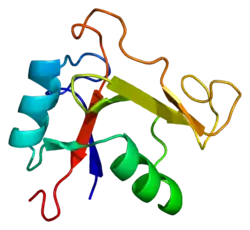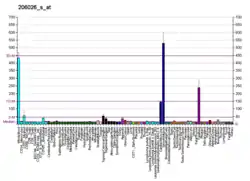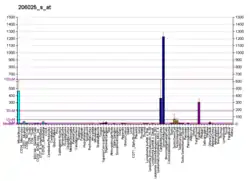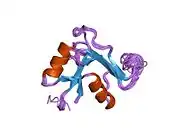TSG-6
Tumor necrosis factor-inducible gene 6 protein also known as TNF-stimulated gene 6 protein or TSG-6 is a protein[5] that in humans is encoded by the TNFAIP6 (tumor necrosis factor, alpha-induced protein 6) gene.[6][7]
Structure and function
TSG-6 is a 30 kDa secreted protein that contains a hyaluronan-binding LINK domain a and thus is a member of the hyaluronan-binding protein family, also called hyaladherins. The hyaluronan-binding domain is known to be involved in extracellular matrix stability and cell migration. This protein has been shown to form a stable, covalent complex with inter-alpha-inhibitor (IαI), and thus enhance the serine protease inhibitory activity of IαI, which is important in the protease network associated with inflammation. The expression of this gene can be induced by a number of signalling molecules, principally tumor necrosis factor α (TNF-α) and interleukin-1 (IL-1). The expression can also be induced by mechanical stimuli in vascular smooth muscle cells, and is found to be correlated with proteoglycan synthesis and aggregation.[7] TSG-6 has been shown to modulate macrophage plasticity and signal the transition of LPS-treated macrophages from pro- to anti-inflammatory phenotype.[8]
TSG-6 also interacts with a number of matrix associated molecules such as aggrecan, versican, thrombospondin (1&2), pentraxin-3 and fibronectin.
References
- GRCh38: Ensembl release 89: ENSG00000123610 - Ensembl, May 2017
- GRCm38: Ensembl release 89: ENSMUSG00000053475 - Ensembl, May 2017
- "Human PubMed Reference:". National Center for Biotechnology Information, U.S. National Library of Medicine.
- "Mouse PubMed Reference:". National Center for Biotechnology Information, U.S. National Library of Medicine.
- Lee TH, Wisniewski HG, Vilcek J (January 1992). "A novel secretory tumor necrosis factor-inducible protein (TSG-6) is a member of the family of hyaluronate binding proteins, closely related to the adhesion receptor CD44". The Journal of Cell Biology. 116 (2): 545–57. doi:10.1083/jcb.116.2.545. PMC 2289279. PMID 1730767.
- Lee TH, Klampfer L, Shows TB, Vilcek J (March 1993). "Transcriptional regulation of TSG6, a tumor necrosis factor- and interleukin-1-inducible primary response gene coding for a secreted hyaluronan-binding protein". The Journal of Biological Chemistry. 268 (9): 6154–60. PMID 8454591.
- "Entrez Gene: TNFAIP6 tumor necrosis factor, alpha-induced protein 6".
- Mittal M, Tiruppathi C, Nepal S, Zhao YY, Grzych D, Soni D, Prockop DJ, Malik AB (December 2016). "TNFα-stimulated gene-6 (TSG6) activates macrophage phenotype transition to prevent inflammatory lung injury". Proceedings of the National Academy of Sciences of the United States of America. 113 (50): E8151–E8158. doi:10.1073/pnas.1614935113. PMC 5167170. PMID 27911817.
Further reading
- Milner CM, Day AJ (May 2003). "TSG-6: a multifunctional protein associated with inflammation". Journal of Cell Science. 116 (Pt 10): 1863–73. doi:10.1242/jcs.00407. PMID 12692188.
- Fries E, Kaczmarczyk A (2004). "Inter-alpha-inhibitor, hyaluronan and inflammation" (PDF). Acta Biochimica Polonica. 50 (3): 735–42. doi:10.18388/abp.2003_3664. PMID 14515153.
- Milner CM, Higman VA, Day AJ (June 2006). "TSG-6: a pluripotent inflammatory mediator?". Biochemical Society Transactions. 34 (Pt 3): 446–50. doi:10.1042/BST0340446. PMID 16709183.
- Wisniewski HG, Burgess WH, Oppenheim JD, Vilcek J (June 1994). "TSG-6, an arthritis-associated hyaluronan binding protein, forms a stable complex with the serum protein inter-alpha-inhibitor". Biochemistry. 33 (23): 7423–9. doi:10.1021/bi00189a049. PMID 7516184.
- Klampfer L, Lee TH, Hsu W, Vilcek J, Chen-Kiang S (October 1994). "NF-IL6 and AP-1 cooperatively modulate the activation of the TSG-6 gene by tumor necrosis factor alpha and interleukin-1". Molecular and Cellular Biology. 14 (10): 6561–9. doi:10.1128/MCB.14.10.6561. PMC 359186. PMID 7935377.
- Wisniewski HG, Hua JC, Poppers DM, Naime D, Vilcek J, Cronstein BN (February 1996). "TNF/IL-1-inducible protein TSG-6 potentiates plasmin inhibition by inter-alpha-inhibitor and exerts a strong anti-inflammatory effect in vivo". Journal of Immunology. 156 (4): 1609–15. PMID 8568267.
- Kohda D, Morton CJ, Parkar AA, Hatanaka H, Inagaki FM, Campbell ID, Day AJ (September 1996). "Solution structure of the link module: a hyaluronan-binding domain involved in extracellular matrix stability and cell migration". Cell. 86 (5): 767–75. doi:10.1016/S0092-8674(00)80151-8. PMID 8797823. S2CID 16347386.
- Parkar AA, Kahmann JD, Howat SL, Bayliss MT, Day AJ (May 1998). "TSG-6 interacts with hyaluronan and aggrecan in a pH-dependent manner via a common functional element: implications for its regulation in inflamed cartilage". FEBS Letters. 428 (3): 171–6. doi:10.1016/S0014-5793(98)00523-7. PMID 9654129. S2CID 30827372.
- Lee RT, Yamamoto C, Feng Y, Potter-Perigo S, Briggs WH, Landschulz KT, Turi TG, Thompson JF, Libby P, Wight TN (April 2001). "Mechanical strain induces specific changes in the synthesis and organization of proteoglycans by vascular smooth muscle cells". The Journal of Biological Chemistry. 276 (17): 13847–51. doi:10.1074/jbc.M010556200. PMID 11278699.
- Nentwich HA, Mustafa Z, Rugg MS, Marsden BD, Cordell MR, Mahoney DJ, Jenkins SC, Dowling B, Fries E, Milner CM, Loughlin J, Day AJ (May 2002). "A novel allelic variant of the human TSG-6 gene encoding an amino acid difference in the CUB module. Chromosomal localization, frequency analysis, modeling, and expression". The Journal of Biological Chemistry. 277 (18): 15354–62. doi:10.1074/jbc.M110765200. PMID 11854277.
- Getting SJ, Mahoney DJ, Cao T, Rugg MS, Fries E, Milner CM, Perretti M, Day AJ (December 2002). "The link module from human TSG-6 inhibits neutrophil migration in a hyaluronan- and inter-alpha -inhibitor-independent manner". The Journal of Biological Chemistry. 277 (52): 51068–76. doi:10.1074/jbc.M205121200. PMID 12401803.
- Anderson NL, Polanski M, Pieper R, Gatlin T, Tirumalai RS, Conrads TP, Veenstra TD, Adkins JN, Pounds JG, Fagan R, Lobley A (April 2004). "The human plasma proteome: a nonredundant list developed by combination of four separate sources". Molecular & Cellular Proteomics. 3 (4): 311–26. doi:10.1074/mcp.M300127-MCP200. PMID 14718574.
- Sanggaard KW, Karring H, Valnickova Z, Thøgersen IB, Enghild JJ (March 2005). "The TSG-6 and I alpha I interaction promotes a transesterification cleaving the protein-glycosaminoglycan-protein (PGP) cross-link". The Journal of Biological Chemistry. 280 (12): 11936–42. doi:10.1074/jbc.M409016200. PMID 15653696.
- Blundell CD, Almond A, Mahoney DJ, DeAngelis PL, Campbell ID, Day AJ (May 2005). "Towards a structure for a TSG-6.hyaluronan complex by modeling and NMR spectroscopy: insights into other members of the link module superfamily". The Journal of Biological Chemistry. 280 (18): 18189–201. doi:10.1074/jbc.M414343200. PMID 15718240.
- Mindrescu C, Le J, Wisniewski HG, Vilcek J (May 2005). "Up-regulation of cyclooxygenase-2 expression by TSG-6 protein in macrophage cell line". Biochemical and Biophysical Research Communications. 330 (3): 737–45. doi:10.1016/j.bbrc.2005.03.040. PMID 15809059.








